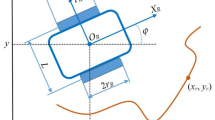Abstract
This paper describes a mobile robot navigation control system based on fuzzy logic. Fuzzy rules embedded in the controller of a mobile robot enable it to avoid obstacles in a cluttered environment that includes other mobile robots. So that the robots do not collide against one another, each robot also incorporates a set of collision prevention rules implemented as a Petri Net model within its controller. The navigation control system has been tested in simulation and on actual mobile robots. The paper presents the results of the tests to demonstrate that the system enables multiple robots to roam freely searching for and successfully finding targets in an unknown environment containing obstacles without hitting the obstacles or one another.
Similar content being viewed by others
References
Abdessemed, F., Benmahammed, K., and Monacelli, E.: On using evolutionary programming for a mobile robot fuzzy motion controller, in: Proc. of the 2000 IEEE Internat. Symposium on Intelligent Control, July 2000, pp. 37–42.
Beaufrere, B. and Zeghloul, S.: A mobile robot navigation method for using a fuzzy based method: Simulation and experimental aspects, Internat. J. Robotics Automat. 10(3) (1995), 106–113.
Boem, H. R. and Cho, H. S.: A sensor-based navigation for a mobile robot using fuzzy-logic and reinforcement learning, IEEE Trans. Systems Man Cybernet. 25(3) (1995), 464–477.
Czarnecki, C. A., John, R. I., and Bennett, S. C.: The application of fuzzy logic to real time multiple robot collision avoidance, in: Proc. of the ICSC Fuzzy Logic Symposium, 1995, pp. 116–121.
Ishikawa, S.: A method of autonomous mobile robot navigation by using fuzzy control, Adv. Robotics 9(1) (1995), 29–52.
Maeda, M., Shimakawa, M., and Murakami, S.: Predictive fuzzy control of an autonomous mobile robot with forecast learning function, Fuzzy Sets Systems 72(1) (1995), 51–60.
Martinez, A., Tunstel, E., and Jamshidi, M.: Fuzzy-logic based collision-avoidance for a mobile robot, Robotica 12(6) (1994), 521–527.
Parhi, D. R.: Navigation of multiple mobile robots in an unknown environment, PhD Thesis, Cardiff School of Engineering, University of Wales, UK, 2000.
Peterson, J. L.: Petri Net Theory and the Modelling of Systems, Prentice-Hall, Englewood Cliff, NJ, 1981.
Seraji, H. and Howard, A.: Behavior-based robot navigation on challenging terrain: A fuzzy logic approach, IEEE Trans. Robotics Automat. 18(3) (2002), 308–321.
Tanaka, K.: An Introduction to Fuzzy Logic for Practical Application, Springer, New York, 1997.
Yang, S. X., Hao, L., and Meng, M.: Fuzzy control of a behaviour-based mobile robot, in: The 12th IEEE Internat. Conf. on Fuzzy Systems, FUZZ ‘03, May 2003, Vol. 1, pp. 319–324.
Author information
Authors and Affiliations
Corresponding author
Rights and permissions
About this article
Cite this article
Parhi, D.R. Navigation of Mobile Robots Using a Fuzzy Logic Controller. J Intell Robot Syst 42, 253–273 (2005). https://doi.org/10.1007/s10846-004-7195-x
Received:
Revised:
Issue Date:
DOI: https://doi.org/10.1007/s10846-004-7195-x




